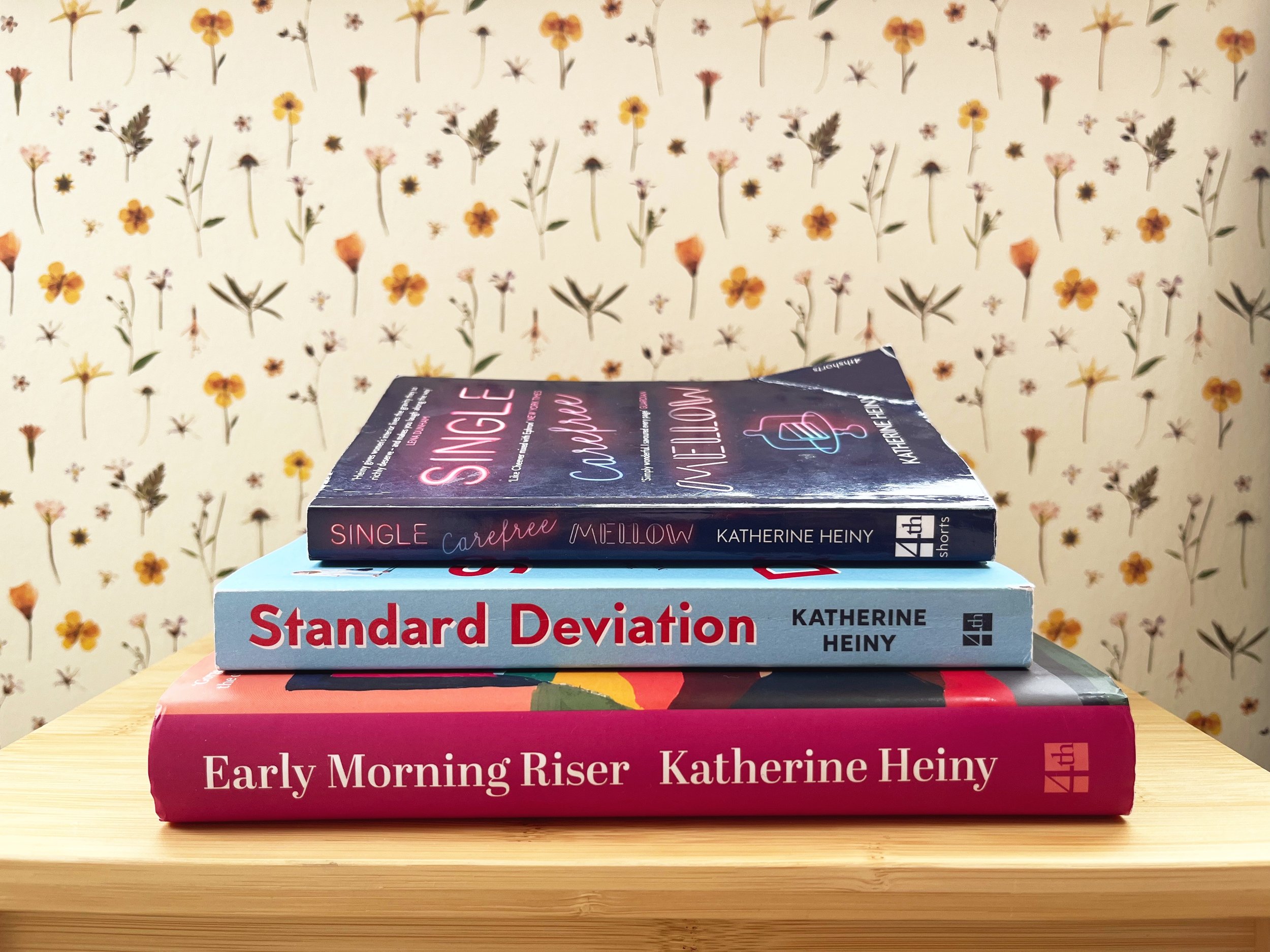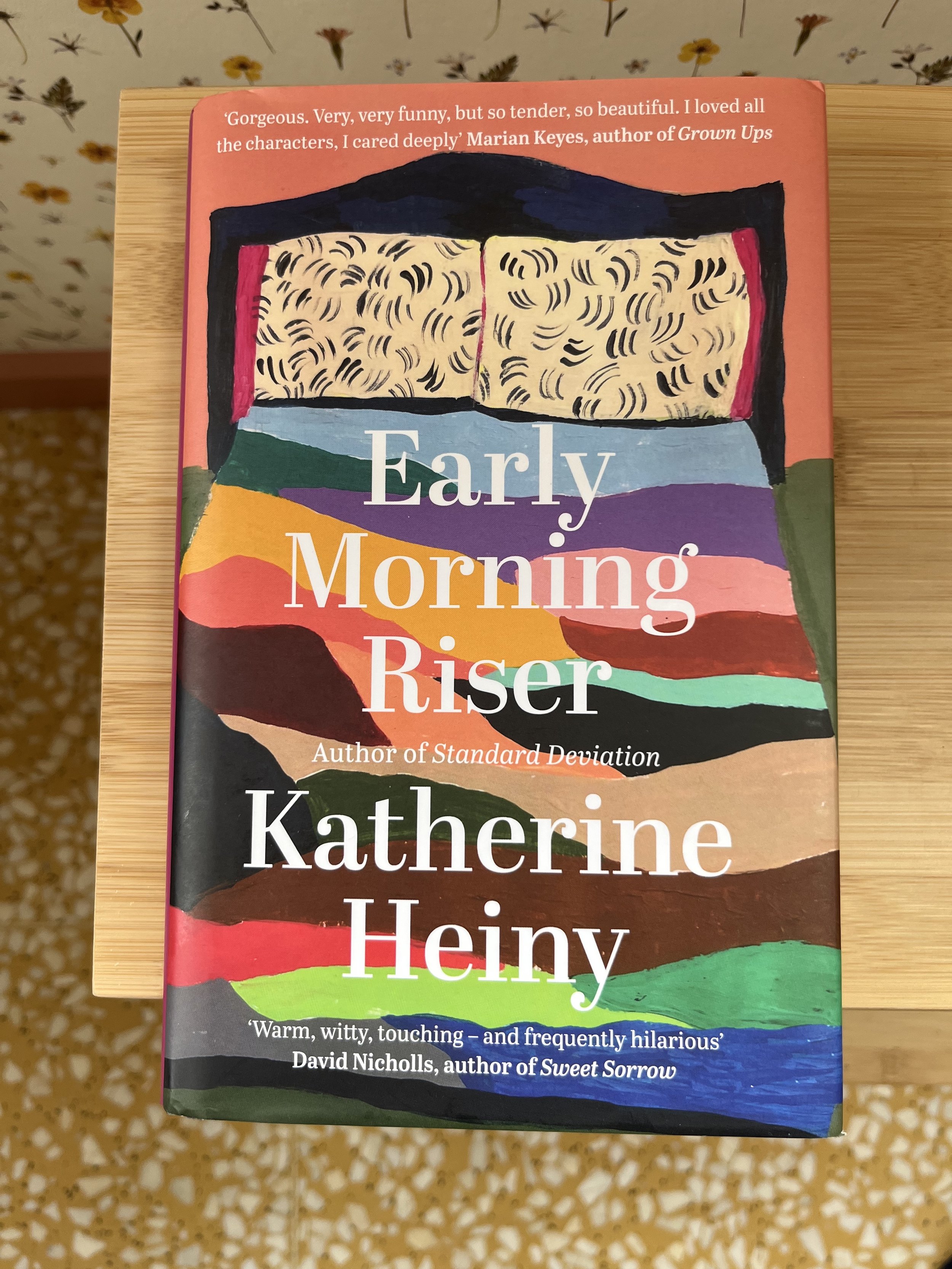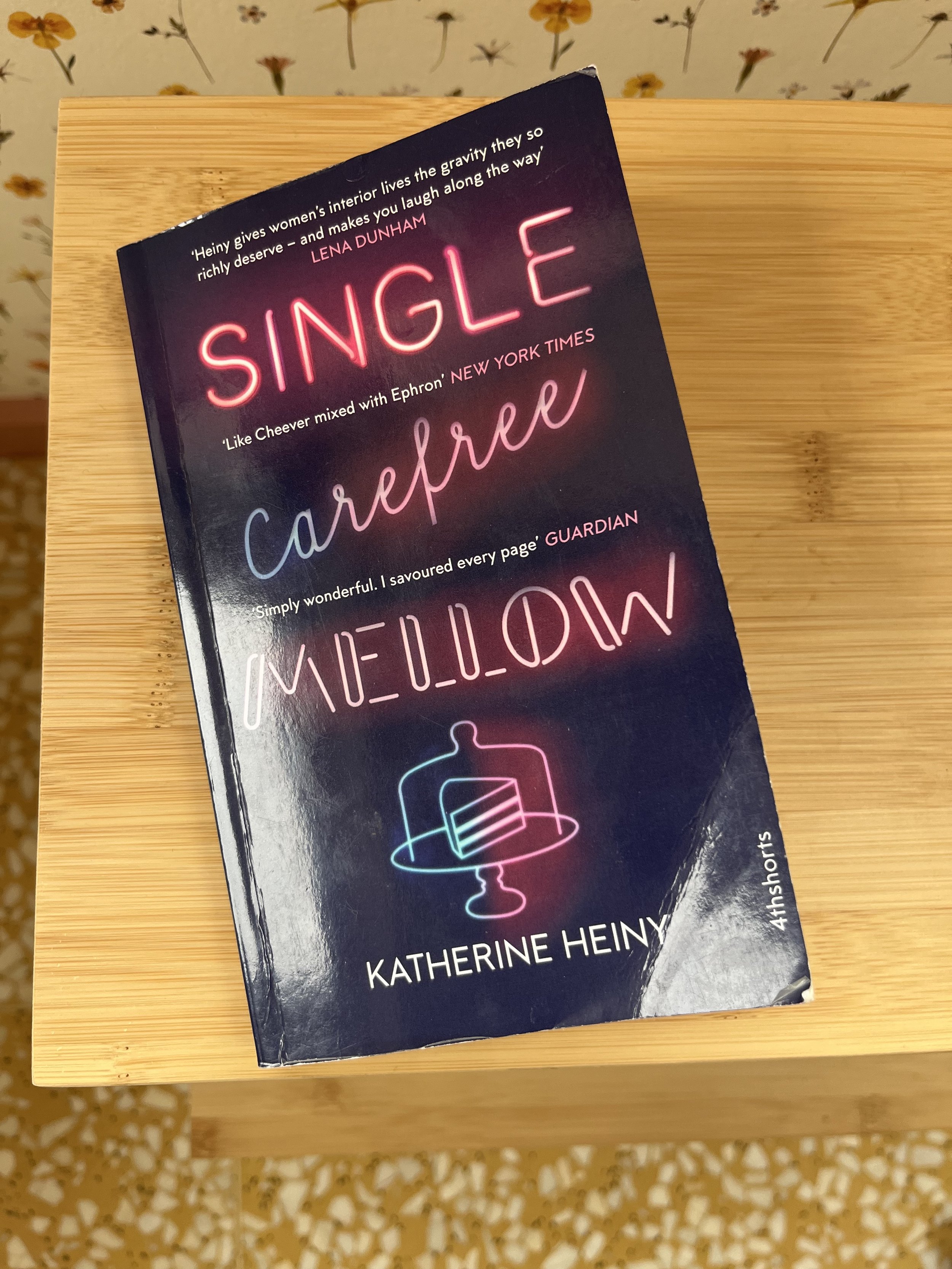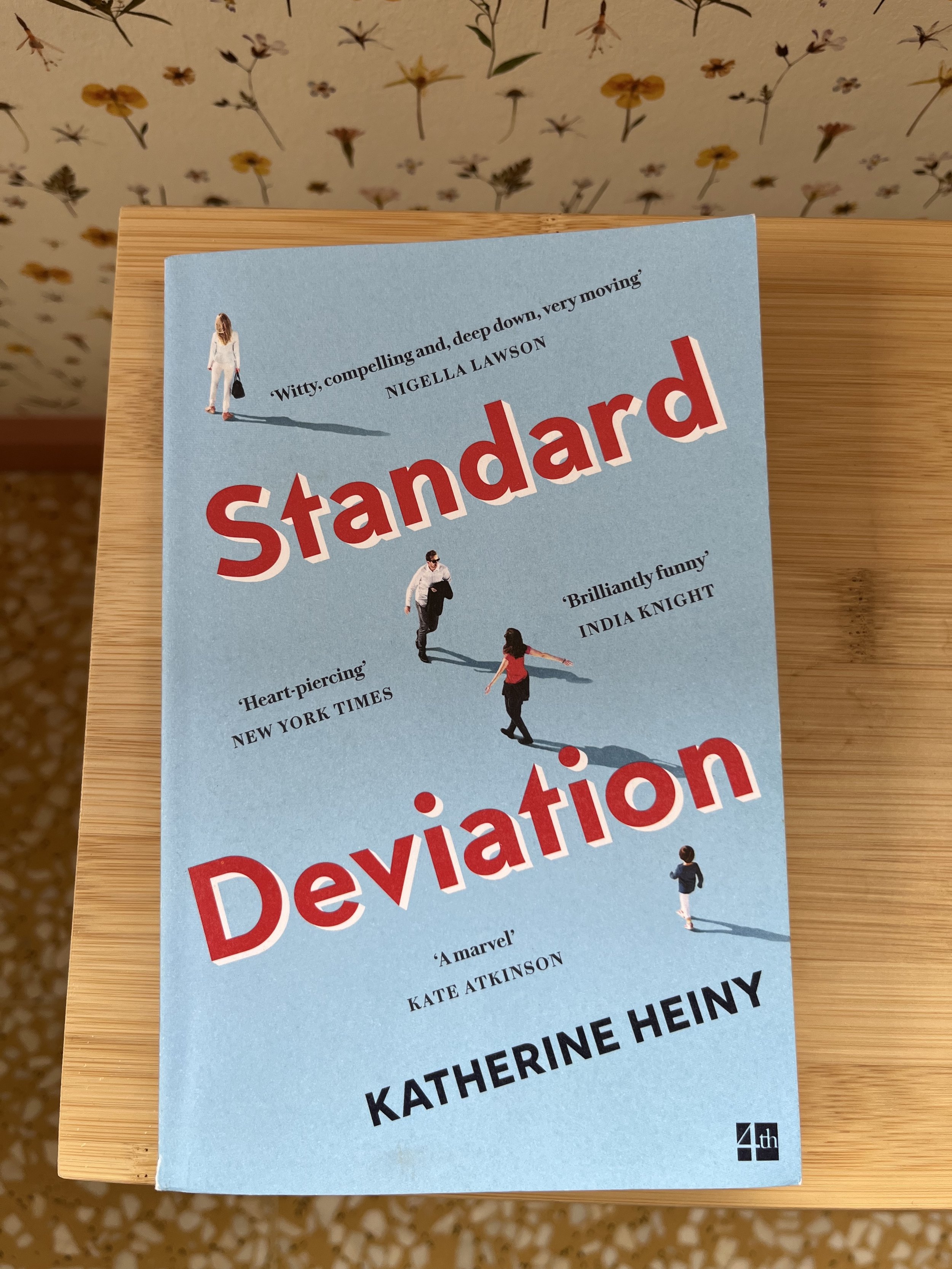Comfort reading with Katherine Heiny
I’ve been under the weather lately and so I have been craving books full of delight. At times like this, I want nothing less from my literature than for it it be charming. I want to read books that make me laugh and smile. Books that aren’t twee, but are witty and warm. Books that are quite simply lovely.
And so I found myself re-reading Katherine Heiny, author of the short story collection Single, Carefree, Mellow, and novels Standard Deviation and Early Morning Riser. I started again with her short stories, a collection I must have already read three or four times but feels just as refreshing every time I return to it.
This is a collection of stories about women at different stage of their adult lives, living in New York. Each story centres on a relationship, whether it’s an affair (it is full of affairs!), a marriage, a friendship. But what they are really about, to me, more than anything else, is tenderness. It’s exactly what I want to read when I’m feeling low.
I love these short stories so much, precisely because they don’t take themselves too seriously, even when occasionally there is a touch of darkness. Katherine Heiny is funny! She writes with a lightness of touch, but she’s also sharp and quick off the mark. But even so, every now and again, there’s a line that just throws you, moves you, that reveals something meaningful and poignant, but in a very understated way. It’s no surprise she was once described as ‘Cheever mixed with Ephron.’
My three favourite stories are:
That Dance You Do
That Dance You Do, written in second person ‘you’, is about a mother who is preparing for her son’s chaotic eighth birthday party (not entirely dissimilar to the ‘drop off’ birthday party in Motherland). During the chaos of her son’s birthday party, she notices her husband:
‘Annoyingly, he is drinking a scotch on the couch and reading The Wall Street Journal as though this party has nothing to do with him. As though you, and a mentally unstable magician, and a redheaded babysitter, and a dozen little boys about to embark on a sugar high, were just some raucous group in a restaurant that he will be careful not to go to again.’
I love how refreshingly unsentimental this is! And yet, there’s a really lovely moment when said-husband feeds the kids and says he’ll order pizza as soon as the children are in bed. I love how the mother’s love for her children pops up in between just wanting the party to be over. It’s just so naturally written, nothing is overdone.
Single, Carefree, Mellow
One of a few stories with recurring characters, Maya and Rhodes. Maya is reluctant to commit to Rhodes, quick to run through all the reasons she can’t stand him in her head, but it’s for all those reasons she loves him too. I love following the Maya-Rhodes relationship throughout the book (they appear again in the stories Dark Matter and Grendel’s Mother, and I was delighted to find them again in this very short story After Dinner) ; it’s one of the least complicated relationships in the book in a way (she loves him!) but it’s Maya who complicates everything and is out to self-sabotage!
‘The problem was, of course, that although sometimes Maya’s heart was gone, sometimes it came back. Sometimes she could actually feel it thump back into her chest so hard it made her rib cage rattle. And then she would have to see Rhodes, would have to put her arms around his thin body and kiss him, even though he was too tall to kiss comfortably, would have to touch his face and brush his hair out of his eyes, and hear his voice, even if he was saying something unbearably boring about computers to somebody else, like, ‘NFS keeps timing out and locking up my whole system.’
There were times when nothing but Rhodes would do.’
I adore this gorgeous, gorgeous story of a young woman secretly in love with her flatmate which you can read in the New Yorker here. Written in second person, it captures the torment and tenderness of longing in such a simple yet moving, and also funny, lovely light way. Every now and again, while telling some sort of potentially humorous anecdote, like going to buy a bed with the flatmate (‘This is a great activity for you, it’s almost like being engaged’), Heiny lets slip these lines which are so beautiful and lovingly-written that I can’t help but feel my heart break a little. Like:
‘Wonder if you feel too comfortable with him to truly be in love. But then he licks the fudge off his thumb and smiles at you, his hair still ruffled from the wind outside. He is the love of your life, no question about it.’
I mean: doesn’t it just do something to you?
Before I go, I wanted to also share Katherine Heiny’s success story, because I find it so inspiring. If you’re a writer who happens to be a mother, if you find yourself longing to write but can’t see that it’ll ever happen for you, then I urge you to keep reading!
Katherine Heiny’s journey to publication
Whenever I fall in love with an author’s work, I end up down a rabbit hole of wanting to read/watch/listen to everything about them; interviews, reviews and so on. And so it was that I found myself listening to an episode of the Write-Off podcast with Francesca Steele in which she interviews Katherine Heiny. I’d assumed, given the success of her novels and the way everyone always mentions them, that she must have always been some kind of literary star. But it was so surprising, and oddly reassuring, to learn it didn’t happen overnight for her at all.
Her story goes like this: when she was 25, she wrote How To Give The Wrong Impression and sent it out to a bunch of publications for consideration. She received thirty-one rejections–but The New Yorker accepted it. Now, you’d be forgiven for assuming that this is as far her story goes, as in: New Yorker accepted her story, and then she became a literary star. Right? Wrong.
Her story was published in 1992. But Single, Carefree, Mellow (her first book) wasn’t published until 2015. It took her twenty-three years to get there. Twenty-three!
It’s not that she wasn’t writing in-between–she was writing YA books essentially to order under another name, finishing off some series for a publisher and starting a new one; but it wasn’t the kind of writing she really wanted to be doing. She was also raising her two sons. In the podcast she described how it was a hard time for her, even though she loved her sons and loved being a mother, because she wasn’t doing the writing she wanted to do. She talked about how, as a family, they’d have these movie nights together, and how sometimes those movies would have writers in them. She said:
‘I’d feel really depressed because I’d be like: that’s not me anymore.’
It was only when her children grew up that she felt she had the headspace to write the kind of fiction she’d always dreamt of writing, not the YA-to-order. And so, twenty-three years after her story was published in The New Yorker, she finally did.
When Francesca asked her what it was like, to return to writing the books she really wanted to write, Katherine said:
‘It’s still there waiting for you, if you can pick it back up again.’
And I just loved that. I paused the podcast at that point, and typed what Katherine said into my phone. It made me happy. I liked that it might be something to hold onto and believe in even when you feel like nothing is happening for you: that it takes as long as it takes to fulfil our ambitions, but they’ll be waiting in the wings anyway.
And if you feel like you’re ready to start your writing journey, if it’s reached a point whereby you don’t want to put it off any longer, then keep reading to find out more about my writing course, designed to help and inspire you to begin writing, The Quiet Words
The Quiet Words starts on April 3rd, 2023
An eight-week writing course on the craft of writing creatively. Learn how to write beautifully. Learn how to begin.
The Quiet Words will gently help you to establish a writing practice, uncover your writing voice and learn to trust your writing instinct, through a series of thoughtful weekly essays, creative homework and inspiring reading lists to help you grow as a writer.
‘The Quiet Words really was magical.’ (Student testimonial)




